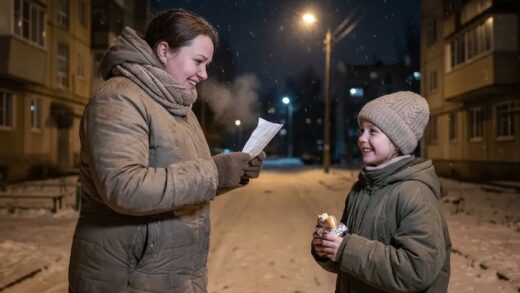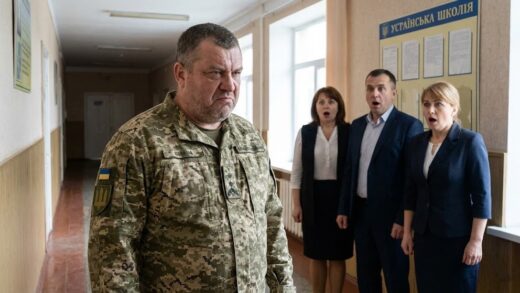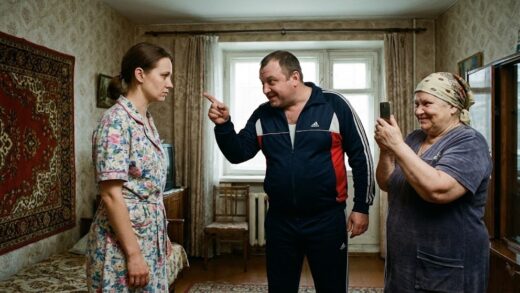Edward Hawthorne sat alone in his study, glass of scotch untouched beside him, the note Maya had left resting on the desk like a judgment. If you can’t stay for them, at least don’t push away the ones who will. He’d read it seven times.
Outside, dusk spread over the estate like a heavy quilt, and the wind pressed softly against the windows. Inside, the twins still slept, oblivious to the storm they’d just slept through, oblivious to the fact that the one person they’d allowed into their fragile world was gone. Edward leaned back in his leather chair and rubbed his temples.
His hand stung faintly, the ghost of the slap he’d delivered still etched into his skin. He hadn’t planned it. It wasn’t who he believed he was, and yet it had happened.
A moment of misjudged fury, born from grief, and a thousand quiet failures. He had hit a woman, and not just any woman. He stood suddenly and made his way upstairs.
The hallway outside the boys’ bedroom smelled faintly of lavender and warm cotton. A small wooden stool sat against the wall. Maya’s sketchbook was on top, closed neatly, as if she’d left it there on purpose.
He picked it up. Inside were simple drawings, rough, untrained, but full of heart. Two boys holding hands beneath a tree.
A tall house with too many windows. A figure sitting between the boys, arms stretched out like wings. A short caption beneath.
The one who stays. He exhaled slowly. In the nursery, Eli stirred.
Edward peeked inside. The boy rolled over but didn’t wake. No nightmares.
No tears. He closed the door softly. Downstairs, Mrs. Keller was folding napkins when Edward entered the kitchen.
She looked up and froze. Something in his expression told her to put the linen aside. She’s gone, he said simply.
I know, she replied. I made a mistake, he said almost to himself. Mrs. Keller raised her eyebrows, but her voice stayed neutral.
You don’t say. She was in my bed. She was in your room, Keller corrected.
Because the boys wouldn’t sleep anywhere else. You weren’t here. I was.
I heard them cry, beg for her. She calmed them. He pressed his lips together.
I thought, I know what you thought, she said gently. But you weren’t thinking. Silence stretched between them.
He looked at the chair where Maya had sat during lunch only yesterday. It felt like weeks ago. I need to find her, he said.
Mrs. Keller didn’t argue. Start with the return address on her letter. Georgia, he nodded, already heading toward the hall.
Across town, Maya sat alone on a bench outside the train station. Her cheeks still throbbed beneath the cold. She hadn’t cried.
Not when he yelled. Not when he hit her. Not even when she walked past the front gates with nothing but her bag and the ache of unfinished work in her chest.
But now, with her coat wrapped tight, and her fingers wrapped around a lukewarm cup of vending machine coffee, tears finally welled. She wiped them quickly. Not because she was ashamed but because crying in public was a habit she’d spent years unlearning.
A woman nearby watched her for a moment, then offered a tissue without a word. Maya smiled in thanks, and looked up at the night sky. It was funny, in a cruel way.
She had survived worse than a slap. She’d endured being abandoned by a foster family at age 11, losing her own son to illness, being told over and over that she was too soft, to handle hard cases. But that house, those boys, they had reached something inside her she hadn’t touched in years.
What do you think of Maya? If you believe she’s someone truly special, give her a like to show your support. And don’t forget to share where you’re watching this video from who knows, someone right near you might be watching it too. The train pulled in with a long sigh of brakes and metal.
She stood slowly, not sure if she’d bored. Her ticket was in her coat pocket. Destination, Savannah.
But her heart was still upstairs in a white house in Greenwich, where two boys were finally learning to sleep. She sat back down. The next morning, Edward stood in his son’s room with a tray of breakfast, scrambled eggs, toast with strawberry jam, a small bowl of cut fruit.
He hadn’t done this before. Not once since their mother died. Eli sat up groggily.
Where’s Miss Maya? Edward hesitated. Ethan sat up too. Is she gone? Edward nodded.
She had to leave. Why? Ellie’s voice cracked. She didn’t do anything bad, Ethan said, eyes narrowing.
She helped us. You saw. We were good.
Edward knelt beside the bed, placing the tray on the nightstand. It wasn’t your fault. It was mine.
Eli looked at him hard. Did you yell at her? Edward didn’t lie. Yes.
Did you hit her? Ethan’s voice was low. Edward’s throat tightened. He nodded once.
Both boys turned away. He stayed there, kneeling on the carpet, for a long time. I’ll fix it, he said finally.
I’ll bring her back. They didn’t respond. But they heard him.
Later that day, Maya boarded a local bus, not a train and headed to the nearby shelter where she used to volunteer. She needed space, perspective, somewhere to remember that the world was bigger than one house, even one that held her heart. She taught a writing class that afternoon to a group of teen girls, many of them runaways.
She told them stories not about Edward or his children but about choosing to stay when others walk away, about knowing your worth, even when others don’t. When she left the shelter, there was a note stuck in the spokes of her bike. It wasn’t from Edward.
But it said, They asked for you, both of them. Maya looked up at the sky, now streaked with orange. And this time, she smiled.
Edward Hawthorne didn’t knock. He stepped into the old community center just as the sun was beginning its descent behind the trees, casting long golden shadows across the gymnasium floor. The sound of his polished shoes on linoleum was out of place here like a cello in a punk rock band.
But he didn’t flinch. He scanned the room, spotting Maya at the far end, crouched beside a whiteboard, erasing crooked letters from a lesson. Around her, teenage girls gathered in a loose circle, laughing, joking, their notebooks sprawled on the floor.
Maya laughed with them, her voice lighter than he remembered, not free of pain but unburdened, for a moment. He didn’t realize how tightly he’d been holding his breath until she looked up and saw him. The laughter died, not because anyone told it to, but because something in Maya’s posture shifted like a curtain drawn mid-performance.
She stood, he walked forward, his hands empty, no briefcase, no apology letter, just the weight of what he had done. I need to talk to you, he said. The girls looked at him warily, one of them stepping slightly in front of Maya.
It’s okay, Maya said gently, and the girl relaxed. Edward glanced at the whiteboard. A single sentence had been written across the top.
Your voice has value, even when it shakes. He turned to Maya. May I? She nodded, leading him outside to the bench by the bus stop, the same one she’d sat on the day before, coffee in hand, tears hidden in the corners of her eyes.
I was wrong, he said immediately. I judged you, I reacted without listening, and I put my hands on you. That’s something I will regret for the rest of my life.
Maya said nothing. I saw you in my space, in my bed, he continued, and I let fear speak louder than truth. That wasn’t just unfair, it was cruel.
Uh, you didn’t believe me, she said. Her voice wasn’t angry, just tired. Even after your sons trusted me.
I know, he said. She looked away. You don’t get to walk back into my life because you finally realized I was telling the truth.
I’m not here to clear my name, he said. I’m here because they asked for you, not a nanny, you. Maya’s eyes softened.
How are they? Quiet, I admitted. Too quiet. She nodded slowly.
That’s not peace. That’s a wound closing over without healing. Uh.
He looked down, hands clasped between his knees. I want to fix this. You can’t fix it, she said.
But you can start with acknowledging that what your sons need isn’t control, it’s connection. He exhaled. Come back.
She didn’t answer right away. Instead, she asked. If I say yes, will I still be staff? He hesitated.
Number you’ll be. You’ll have whatever title you want. Advisor.
Mentor. Partner. She raised an eyebrow.
Partner? In their care, he clarified, though the word lingered heavier than he intended. Maya considered it. Fine, she said.
But I have conditions. Of course. First, no cameras in the children’s rooms.
He blinked. There are none. There were, she said.
Last month. One nanny told me. He frowned.
They were meant for safety. They teach the kids that privacy isn’t theirs to keep. He nodded once.
Second, she continued. They eat dinner at the table. With you.
No phones. No business. He hesitated, but nodded again.
Third, she said. We rewrite the house rules. Together.
With them. He stared at her. They’re five, he said.
They’re people, she replied. He cracked the smallest smile. Anything else? She took a deep breath.
Yes. The next time you raise your hand to someone who doesn’t deserve it, anyone I’m gone. And I won’t come back.
His expression fell. Understood. She stood.
I’ll see them in the morning. He stood too. Do you want a ride? She shook her head.
I’ll take the bus. I still have to finish up here. He nodded.
Maya, thank you. She paused. Don’t thank me yet.
We’re starting over, Mr. Hawthorne. And this time, I’m not walking on eggshells. She turned and walked back into the building, the whiteboard waiting for her return.
Edward stood at the curb, watching her go. That night, he cleared the dinner table himself. He called his sons downstairs.













